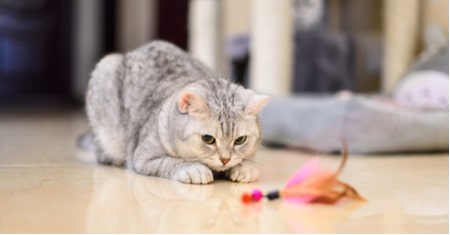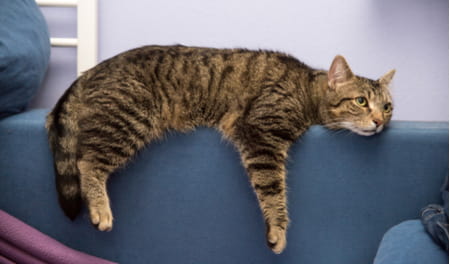
Cats are notorious for hating closed doors. They’ll scratch, claw and yowl all to get to the other side—and sometimes, they don’t even know what they’re after!
To stop your cat from yowling at the door:
- Get them spayed or neutered
- Stick to a schedule that includes regular attention and playtime
- Be consistent with the rules—don’t let your cat into the room one night, then expect them to behave outside the door the next night
- See your veterinarian to rule out health concerns
If a cat is yowling at an outside door, don’t let them out—address their needs in other ways.
Cats yowling at the Outside Door want Outside—But it’s Irresponsible to Let them Out

The easy solution to a cat yowling at an outside door is to let them out. Of course, this will stop their yowling, and they’ll have gotten what they wanted.
However, the easy thing isn’t always the right thing. Allowing your cat outside is irresponsible, primarily because you’re subjecting them to a much shorter lifespan.
The average life expectancy for outdoor cats is 2-5 years, while indoor cats tend to live somewhere around 15 years. Indoor cats don’t wander into traffic, get killed by predators, or catch deadly diseases like Feline Leukemia or Feline Immunodeficiency Virus.
You might think all of this is worth it if your cat is happier outdoors—but when indoor cats are properly cared for, they’re even happier than outdoor cats because they aren’t facing these daily threats and stressors.
And if you still want your kitty to experience the fresh air on their fur, you can try leash training, purchasing or building a cat patio, or even just opening a screened-in window for them to sit at.
Instead, Solve their Boredom through Regular Playtime

Let’s think about why cats would want outside in the first place. What do they get from the experience?
Usually, they are bored and want to get some exercise. They want to hunt, run around, or play with leaves floating by in the breeze.
You can solve this problem without letting them out of the house. All you have to do is spend some time playing with them, and they’ll be ready to cuddle up in a comfy cat bed and sleep the day away.
The best way to ensure your cat is getting proper playtime every day is to work it into your schedule. Cats need around 30-45 minutes of daily play, split into smaller 10-15 minute play sessions. This makes it super easy to fit into your day.
I like to play with my cats before mealtimes, because play stimulates hunting for cats—and once they’re done hunting, they want a meal to fill up their tummies!
You might also try playing with your cat right before bedtime to get them tired out so that they sleep at night, rather than yowling at the front door.
Get your Cat Neutered or Spayed to Stop the Yowling
Your cat could also be yowling to go outside because they’re in heat.
The worst thing you could do is let them out at this point. We already have an overpopulation of homeless cats and kittens who are uncared for.
Instead, get your cat neutered or spayed. They will be healthier, behave better, and it’ll be easier to keep them indoors.
If you can’t afford to go to a traditional veterinarian, check out this resource for cheaper solutions.
Cats Yowling at Inside Doors might want Attention or be bored

Maybe you work from home and close the office door so your cat doesn’t walk across your keyboard every two minutes. Or perhaps you keep your bedroom door closed while you’re sleeping—or, trying to sleep while your cat cries outside.
Your cat is being vocal to tell you they want something. In this case, it’s likely attention or playtime. While sometimes there’s nothing to be done but wait them out, in many cases a schedule will help.
Try playing with them before bed so that they are tired out and sleep when you sleep, or cuddle for a half-hour on the couch while watching TV before its time to get to work.
Having a clear schedule helps your cat know what to expect, and working what they need into this schedule shows them that they will get what they need—just not while you’re busy or asleep. They have to wait until the appropriate time of day!
There will always be those cats who want constant attention, or are clingy and want to be by your side. It’s up to you when or if you give in to their desires—sometimes, a compromise might be necessary.
For example, if all your cat wants is to sit in your lap while you work, you might be more productive with them there, than if you spent the entire time distracted by them meowing outside the office door.
Your Cat might not like Closed Doors

Cats not liking closed doors is super common. Especially if you and your cat are on opposite sides of the closed door, they’re going to want in!
Personally, I have no problem letting my cats roam most of the house. The only place they aren’t allowed is our unfinished basement—and you will hear them yelling at the door if someone’s down there and they want to join.
There’s nothing wrong with keeping your cat out of a certain area of your home. Maybe you don’t like sleeping with a cat in your bed, or you’re locking them out of a room for their own safety.
The important thing is that you’re consistent. If you don’t want them in your bedroom at night, don’t let them in because they cry or scratch at the door.
You also don’t have to put up with the behavior until they get the picture—not always, anyway. In this case, you could try tiring them out before bed or setting up a cozy area in another room for them to sleep in.
And as a last resort, you might want to try compromising with your cat. If letting them in your bedroom is the only way you’ll get any sleep, maybe it’s worth it to make that sacrifice.
Just don’t allow them in one night, then expect them to behave outside the door the next. If anything, giving into their behavior will make them more prone to it.
Never punish your cat for being vocal, though. They’re just trying to tell you what they want, and punishing that communication will harm your relationship and potentially make your cat fear you.
It’s extremely unlikely that they’ll actually realize why they’re being punished and stop the behavior—in this case, they’re more likely to become more vocal as a result of being more upset.
Medical Problems can Cause Cats to be Vocal at Night
If your cat is constantly vocal at night, especially if it’s a new behavior, it’s worth talking to your vet to ensure there’s nothing serious going on.
Cats can become vocal at night as a result of these conditions:
- Thyroid or kidney disease
- Hypertension
- Urinary pain
- Cognitive dysfunction
- Vision or hearing loss
With this in mind, I would be especially concerned about an elderly cat who had newly developed this behavior.
It’s important to remember that anytime your cat has a massive shift in behavior, you should be speaking to your vet. Cats often hide their pain well, and keying into things like this can help you spot medical conditions early.
If your cat has always been very vocal, you have less to worry about in this department. But if you have your doubts, you can always check in just to be safe.

I am a freelance writer who specializes in the pet industry. My full bio
Sources
- https://pets.webmd.com/cats/features/should-you-have-an-indoor-cat-or-an-outdoor-cat#1
- https://www.americanhumane.org/fact-sheet/feline-leukemia-felv/
- https://pets.webmd.com/cats/cat-fiv-feline-immunodeficiency-virus
- https://pets.webmd.com/reasons-spay-neuter-pet
- https://www.aspca.org/pet-care/general-pet-care/low-cost-spayneuter-programs
- https://lifehacker.com/how-to-get-your-cat-to-stop-meowing-at-your-door-at-nig-1796296076